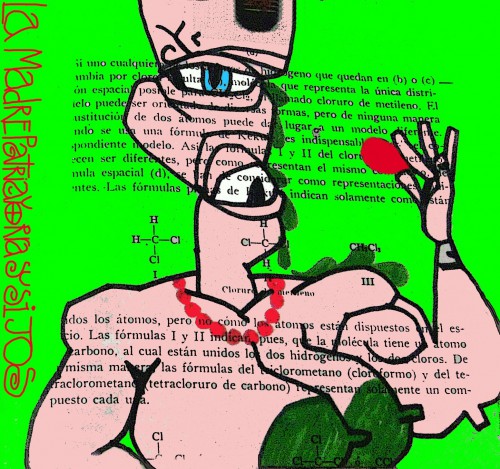From Sampsonia Way Magazine: There are many writers currently creating canon-defying literature inside Cuba. But in the United States, just knowing about most of them is a challenge and reading their work in English is almost impossible. With this in mind, we asked our Fearless, Ink. columnist Orlando Luis Pardo Lazo to compile a collection of short stories from writers who, according to his experience growing up and living inside Cuba, are creating new trends for the future of Cuban Literature. However, this anthology doesn’t aim to be absolute or complete; it is here merely to open a door to the Island’s literary movement.
For this anthology Pardo Lazo decided to focus on writers of Generación Año Cero (Generation Year Zero), a movement of writers who began publishing in 2000. He picked 16 short stories from 16 writers and suggested that we illustrate them with work from the Cuban visual artists El Sexto and Luis Trápaga.
Today Sampsonia Way presents the prologue, by Pardo Lazo, as the first installment of a series that, in the weeks to come, will include the 16 stories, accompanied by a profile of their author, some of his or her statements, and vibrant illustrations from El Sexto or Luis Trápaga.

Prologue by Orlando Luis Pardo
Translated from the Spanish by Mary Jo Porter
New narrative, or newrrative, is quite a challenging term. Especially if it comes out of Cuba, a rather claustrophobic island even today, in these post-revolutionary times, when general Raúl Castro is trying to reform most of the social life in order to keep it under his control (including culture, of course, including literature).
As such, Cuban newrrative emerges not as a passive reaction but as a creative resistance. It emerges from zero, unexpected, from the very margins of literary tradition and the mainstream, coincidentally starting during the so-called zero years in Cuba: The 2000′s decadent decade.
The writers of this newrrative do not belong to a single generation, but at some point in their meteoric careers they have called themselves Generation Year Zero. A rather urban phenomenon, interested in prose much more than in poetry, theater, or essay, they have occupied private and public spaces with their performance readings, which include other artistic expressions, such as music and video-clips.
Expelled or self-excluded from several Cuban institutions throughout their bizarre lives, in their texts many of them seem to mutate easily from irreverence to indolence to incredulity to iconoclasty, and are willing to deconstruct all previous discourses of what “cubanness” is supposed to be, whether erotic or political, ultimately betting it all on a kind of cubanless cubanness.
Thus, this newrrative comprises a wide range of topics that moves from the sordid, more than dirty realism of Lizabel Mónica and Jhortensia Espineta, to the science fiction of Erick Mota, and the intertextuality of Osdany Morales. Some of these writers even manage to express themselves directly in English (like the music lover Raúl Flores) in a kind of xenophilia that aspires to escape from scholarly Hispanic fundamentalism. Others, such as performance artist Polina Martínez Shviétsova or the translator Abel Fernández-Larrea, try to make music with their prose narratives using a post-Soviet language as if it came from another planet (or from a paleo-Revolution not totally passé, as our rulers are octogenarians who survived the rise and fall of real socialism). There are even writers who appropriate a French learned from watching European film festivals, like the blogger Lia Villares.
Some, like Carlos Esquivel and Gleyvis Coro Montanet, give space in their works to a subtle, socially-rooted humor. More than a few are exploring the digital format of the Cuban underground, developing clubs for controversy such as Espacio Polaroid (in Havana) and literary and opinion magazines (which are illegal in Cuba) in the style of: Cacharro(s) by Jorge Alberto Aguiar Díaz, Lizabel Mónica and Orlando Luis Pardo Lazo; 33 y 1 tercio by Raúl Flores, Michel Encinosa and Jorge Enrique Lage; The Revolution Evening Post by Ahmel Echevarría, Jorge Enrique Lage and Orlando Luis Pardo Lazo; La Caja de China by Lien Carrazana; DesLiz by Lizabel Mónica; and Voces by Orlando Luis Pardo Lazo with the renowned Cuban blogger Yoani Sánchez and her husband, independent journalist Reinaldo Escobar.
This rainbow of e-mergent voices has won almost every national award in Cuba, but it is virtually unheard of outside the island. Some new names have been added to Generation Year Zero (Jamila Medina, Anisley Negrín, Arnaldo Muñoz Viquillón, Legna Rodríguez, and Evelyn Pérez, for example), but they do not appear in this initial anthology, of which Sampsonia Way Magazine is now the exclusive publisher. However, the anthology does include the contributions of two controversial graphic artists from Havana: The graffiti artist Danilo Maldonado (otherwise known as “El Sexto”) and the painter Luis Trápaga.

We believe that anthologizing, as with translation, is a form of betrayal. To translate an anthology is, therefore, a double betrayal. But, in literature, only the radical positions are the creative ones. All authentic art takes off from disaster and, as we know, language exists because communication is impossible.
We should, then, think of literature literally as heresy; it is never derived from the aesthetics of cultural ecumenism. We should anthologize from anguish, decide from delirium, instigate from the impossible. In literature, pacifism is the worst sin: Every poetic panorama invites violation with a longitudinal cut, which is more effective if we think in terms of opening veins and arteries with every narration. And thus it is that every anthology is always a little prone to suicide (and, equally, to censorship).
All of Cuba behaves so. It is a ghetto of people half-patriotic and half-stateless. A clickless clinic, because in 2013 the government still hasn’t authorized its citizens’ right to information, which includes, of course, the Internet.
So, to create an anthology in Cuba—a closed fortress placed between internal feudal repression and being the earthly utopia of the international left—is the work of an almost heroic publisher. If, as is the case with this dossier exclusive to Sampsonia Way Magazine, we aim to offer the island’s emerging literary voices, then we no longer have a simple selection, but rather a bet that forces us to take risks (in numbers, names, topics, and styles). This is a bottle tossed into the future, which can explode like a grenade of infinite meanings or barely return to the reader like a listless boomerang.
Let’s be honest: No one knows what will happen tomorrow with the no-longer-that-young Cuban authors of the so-called Generation Year Zero, who are now anthologized from Pittsburgh, or perhaps PittsburgHavana, for the first time in Spanish and English.
Let’s even be cynical: It doesn’t much matter what happens. Literature and prophecy are not synonymous. There is no guarantee of success beyond the unique universe of each authorial text. Literature does not imply certainty—it’s just a symptom of the human experience, which is basically an imaginary experience: Fiction illuminated by emotional memory and expressed according to the limits of language. This is all the wisdom that fits within the literary. And wisdom often ends in dramatic failure.
Let’s go even further for once: These authors don’t fear that failure. They indefatigably seek it. A successful career is always suspicious, or ends up with the guilty feeling that we are collaborating with the status quo.
No, our anthologized writers do not fit within standardized notions of success. Nor do they fit well within the naive idea of the democratic in the minefields of the literary. In the literary world, the majority tends to be mistaken, asleep between the cliches of the canonical tradition and the miracles of market. Such that a kind of “private public” audience must be conceived again and again by each literary generation—especially if it is a generation of Cubans who seem to avoid the classic concept of the literary field, to provoke a literarid feel, while being held hostage by an obsolete State which aspires to replace them as the Ultimate Narrator.
Thus, between the grandiloquent fictions of Power and the minor literature of the newrrative from the Year Zero, or 2000, Cuban Culture gains nothing or, better yet, gains precisely zero. These writers have become the emptying-out of the author versus the violence of the State. This spontaneous nihilism—which prioritizes the histrionic over the historic, the hedonism of inner exile over revolutionary barbarism, the intimate over the institutional (a residual freedom domestic but undomesticated), and the rhetoric over the relating—is what this anthology is attempting to photograph: The New Man is tired not of being a committed intellectual; rather, he is tired of being compelled by forces foreign to his own work and will.
The world’s readers are now getting a peek at a literature that tries to distance itself from Cuban stereotypes without avoiding the terminal tedium of a day lived to the limit which, for the purposes of these authors, is an endless resistance on the margin of contemporaneity.
29 June 2012
